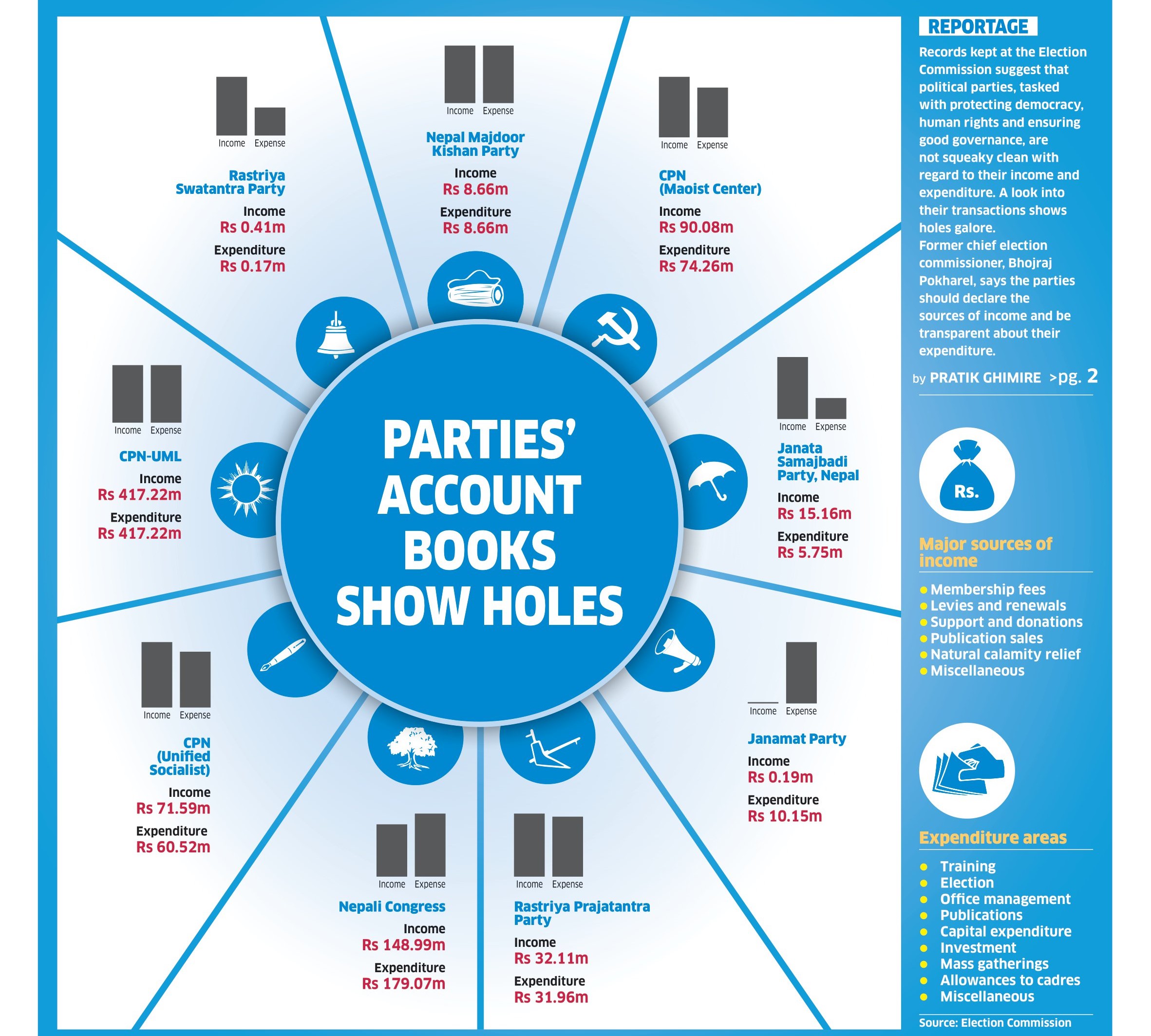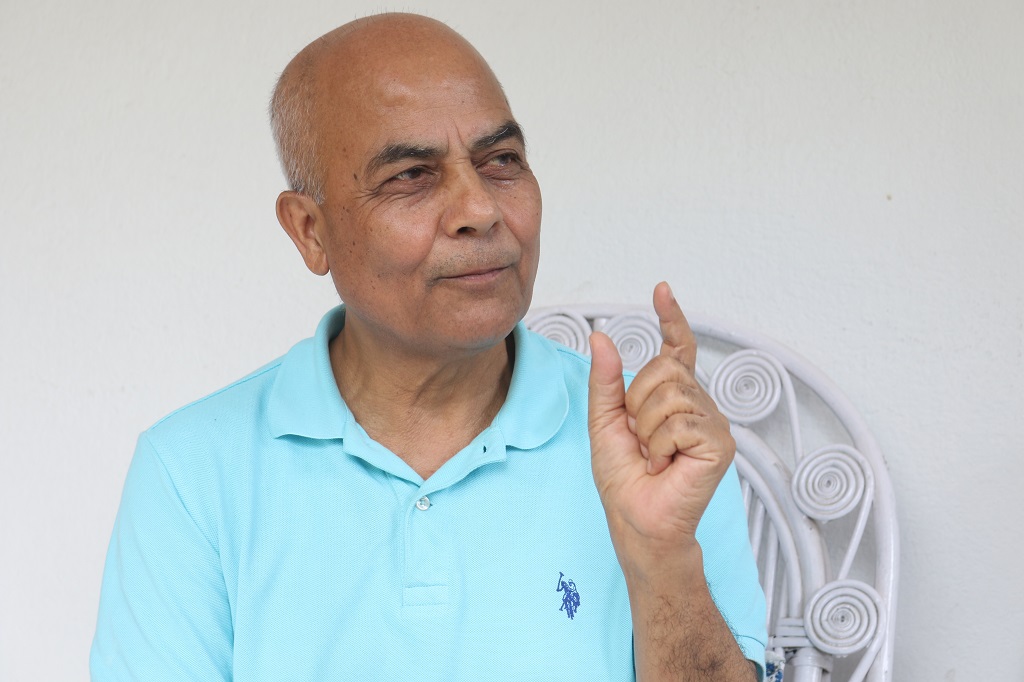Most of the major political parties recently submitted their audit report of fiscal year 2021/22. The political parties—registered at the Election Commission (EC)—are required to maintain real accounts of their income and expenditure, appoint a responsible official for this purpose, audit their income and expenditure within six months of the end of the financial year and submit it to the commission within one month after auditing by a licensed auditor in accordance with the law, says the Article 269 of the Constitution of Nepal 2015 and the Political Party Act, 2017.
According to an EC source, 83 political parties have submitted the report on time. “We are planning to ask those who haven’t submitted the report to submit explanations with valid reasons for not maintaining their accounts and submitting audit reports,” a top EC official told ApEx. The EC, within 45 days of the expiry date of audit report submission, can direct a political party failing to submit its audit report to furnish clarifications with reasons through electronic or other media. According to the audit report, CPN-UML has the highest income and expenditure. The party has mentioned that it had an income of Rs 417,220,317 in the fiscal year 2021/22. The party has said that its expenditure amount is exactly the same as the income.
In the income category, the party has included membership fees, levies and renewals, support and donations, publication sales, natural calamity relief and miscellaneous income. Election, office management, publication, capital expenditure and investment and miscellaneous costs are included in the expenses category. Nepali Congress, currently the largest party of Nepal, has shared that its income for the fiscal year 2021/22 was Rs 148,994,087. The party’s expenses were Rs 179,078,222. This means the party was in loss in the fiscal year 2021/22 by around Rs 30m.
Similarly, the CK Raut-led Janamat Party also suffered a loss of around Rs 9m. While the party had spent Rs 10,150,000, according to the audit report, it had an income of only Rs 190,000. CPN (Maoist Center), who is currently leading the government, had an income of Rs 90,086,064 and expenditure of Rs 74,264,043 in the fiscal year 2021/22. Janata Samajbadi Party, Nepal, led by Upendra Yadav, was in good profit, says the party’s audit report. Their income was Rs 15,166,515 while they spent Rs 5,753,339.
Like the UML, Nepal Majdoor Kishan Party also mentioned their income and expense amount were exactly the same (Rs 8,666,664). Rastriya Prajatantra Party’s income was Rs 32,116,450 and expense was Rs 31,968,786. The CPN (Unified Socialist) has mentioned their income as Rs 71,590,377 and expenditure as Rs 60,529,529 in their audit report for the fiscal 2021/22. The newly formed Rastriya Swatantra Party has also submitted its audit report, which shows that they had an income of Rs 410,010 and the expenditure of Rs 178,255.
A political party failing to maintain or audit its incomes and expenditures or submit audit reports or submit clarifications as directed can be fined up to Rs 20,000, according to existing provisions. In case a political party fails to submit its audit report for three consecutive years, it could be fined up to Rs 50,000 and the commission can direct it to make corrections within six months.
The EC can scrap the registration of a political party committing the fault more than one time or failing to follow the given directive in this regard within one year or failing to pay the imposed fines. Last year, the commission scrapped the registration of 44 political parties for not submitting their audit reports for three consecutive years, despite multiple deadline extensions. As of now, there are 119 registered political parties.
‘Parties are not transparent ’
Bhojraj Pokharel Former Chief Election Commissioner
Nepali political parties are not transparent. They never let you know where they get their so-called support and donation. They don’t even put it in the audit report. These donations are often the reason for internal party disputes. They have internal competition over who collected the most funds and who gets to spend it. This hampers the party structure and organization. Yet, they are not ready to correct themselves. They hire private ‘puppet’ auditors for their bookkeeping. Auditors working for political parties are hiding dirty finances involved in politics.
The Election Commission has the right to investigate the audit report of political parties if they find any suspicious activity or if there are complaints. But the commission, too, ignores it. The audit report is just a formality. This bad culture has been developed for a long time. Unless these parties make their internal work transparent, how can we expect their better commitment for the country?
Big corporate houses and businesspersons and fund the parties secretly, as they too have their motive to fulfill from the political leadership. Ethical enforcement of laws is necessary to make the political parties correct. Or else, every year, they submit an audit report that shows nothing.













